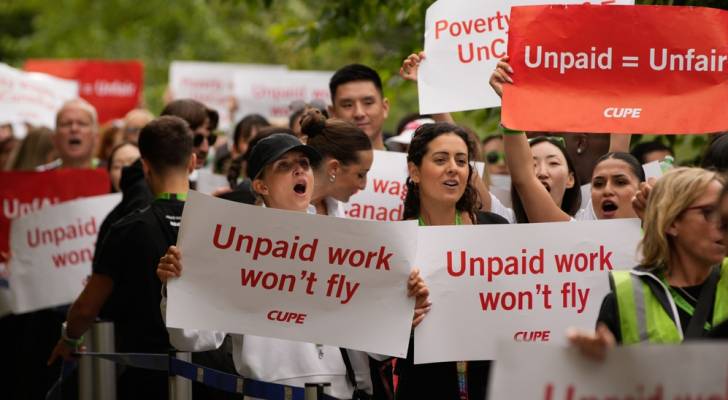
After reaching an impasse in negotiations between the Air Canada component of the Canadian Union of Public Employees (CUPE), a 72-hour strike notice was given on August 13. Three days later, over 100,000 Air Canada employees walked off the job in protest.
Though it has been over a month since the strike concluded, the effects of the labour stoppage have been felt by thousands of Air Canada passengers.
Data given to The Globe and Mail by aviation tech firm airfairness suggests that nearly 54,000 travellers are owed $52-million in compensation under European Union rules related to labour disruptions (1). An additional 15,204 passengers are eligible for compensation under British laws, totaling nearly $15-million, the tech firm estimates.
Overall, airfariness’ data indicates that nearly 3,300 flights were cancelled worldwide between August 13 and 22 — amounting to around 551,697 passengers having their travel plans disrupted.
“It’s a staggering number,” Zohair Khan, co-founder and chief operating officer at airfairness, told the Globe. “I don’t think people realize the amount of travellers in the air at any given day of the year – three days and over half a million people impacted around the world.”
Passenger compensation versus refunds
An important distinction should be noted when it comes to discussing repaying passengers affected by the strike.
The term compensation used by airfairness refers to additional payments for inconvenience (e.g. time lost, stress of disruption) and is separate from a refund. Under Air Canada’s General Terms and Conditions (2), passengers that had their flight cancelled or delayed by three hours or more are entitled to have multiple rebooking or travel change options presented to them. If none of these options work, Air Canada can refund the unused portion of the ticket.
Compensation, on the other hand, only applies if a flight cancellation or delay of three hours or more was due to a situation within Air Canada’s control, and passengers were not notified of the issue 15 days prior to your departure. Under the flight company’s terms, passengers could be compensated up to $1,000 if their flight was delayed by 9 hours or more.
But, passenger rights in Canada make compensation issued for travel plans disrupted by a strike difficult for consumers to claim.
Passenger rights in Canada
According to the non-profit organization Air Passenger Rights (3), Canadians travelling solely within the country are subject to Air Passenger Protection Regulations (APPR). Under these rules, a strike would not qualify as an instance within the control of the carrier. As such, passengers would not be entitled to compensation — only a refund and return to point of origin or a rebooking at no cost to you.
However, the organization notes, if a passenger had an international itinerary, their rights are different. In addition to offering you a free rebooking or a refund and return, Air Canada may need to compensate you based on reasonable expenses incurred during the disruption, lost wages, prepaid hotel nights and other losses as a result of the delay.
Flights departing from the EU, EEA or UK that were affected by the strike are potentially given additional avenues of compensation that flights within Canadian do not have. In addition to a refund and return or free ongoing travel, these passengers must be compensated cash up to €600 if their flight was delayed four hours or more, plus provide the traveller with meals and accommodation, Air Passenger Rights notes.
That said, the organization notes that Air Canada could “dig in its heels and refuse to pay until passengers take them to court” regarding international flight compensation.
What you can do if your flight is cancelled or delayed
While flight disruptions can upend travel plans, they don’t need to cost you more than what you’ve already paid. Here are some tips on how to deal with them.
- Submit a formal claim. If you think you’re owed compensation under a carrier’s terms and conditions, make sure to submit a formal claim. If you’re submitting a claim regarding an Air Canada flight, submit it through its customer relations contact form.
- Be aware of airline policies. Always read the fine print regarding a carrier’s stance on refunds and compensation before you book your tickets.
- Buy travel insurance. Purchasing trip cancellation/delay insurance when booking your trip may provide you additional coverage in the event of a disruption. Certain travel credit cards also come with travel insurance perks you can take advantage of if you used the card to book your vacation.
- Take it to court. If you’ve submitted a claim but haven’t found any recourse, taking the issue to small claims court may be a viable option.
Major events like strikes, unexpected weather or illness can completely derail travel plans. But, they don’t have to cost you more than what you budgeted for. Make sure to do your research on travel cancellation and delay policies before you book your next vacation — your wallet will thank you.
Article sources
We rely only on vetted sources and credible third-party reporting. For details, see our editorial ethics and guidelines.
The Globe and Mail: Air Canada owes passengers more than $66-million in compensation for lost time, inconvenience, tech firm says (1); Air Canada: Our General Terms and Conditions of Carriage (2); Air Passenger Rights: Air Canada Strike 2025: What Are My Rights? (3)
This article provides information only and should not be construed as advice. It is provided without warranty of any kind.